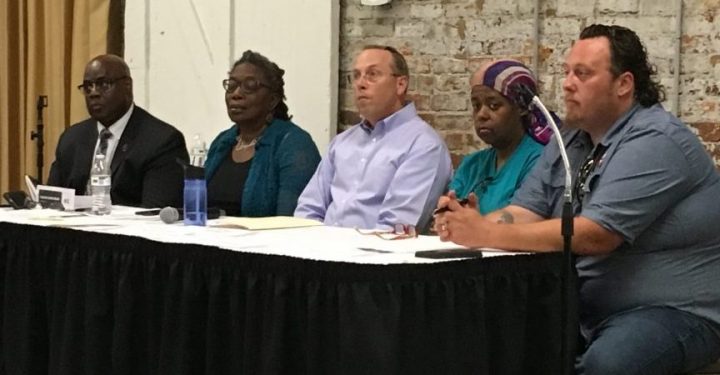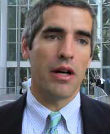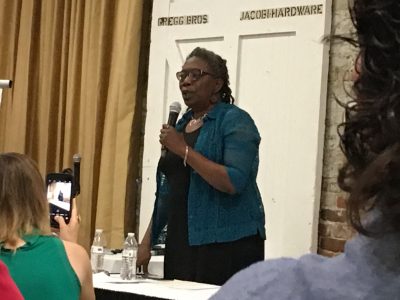
WILMINGTON – The Clean Cape Fear meeting Wednesday focused on getting the message about water contamination to a wider audience and under-served communities, but the discussion also highlighted larger concerns about ongoing environmental justice issues in the state.
“We believe everyone has a right to clean water and that everyone has the same right to as much information everyone else has,” said Harper Peterson, former Wilmington mayor, during his opening remarks to the 100-plus people gathered at downtown’s Coastline Convention & Event Center. Peterson is also a founder of Clean Cape Fear, an alliance of established advocacy groups, community leaders, educators and professionals working together to restore and protect water quality.
Supporter Spotlight
Speakers at the event questioned whether diverse communities of southeastern North Carolina had the same awareness about the presence of GenX, and other perfluoroalkyl chemical compounds that have been linked to a host of serious health effects in both the Cape Fear River and in treated water from the Cape Fear Public Utility Authority.

Cape Fear Riverkeeper Kemp Burdette gave a brief recap of the events of the past several weeks resulting from the Wilmington StarNews breaking the story last month about the release of unregulated chemicals by the Chemours Chemical Co. at the Fayetteville Works industrial site on the Cape Fear River. State regulators last week verified that Chemours is no longer discharging GenX wastewater into the Cape Fear River and is instead diverting it into holding tanks, but water testing continues and concerns remain.
“What I have seen over and over again in my work as an environmentalist is environmental injustice. Whether it’s where we put landfills or hazardous waste incinerators, where we build factory farms or cement plants, or fertilizer plants, the people who are most likely to face disproportionate negative impacts from these facilities are low-income people of color,” Burdette said, adding that these communities often have a limited political voice.
“This happens all over the country, often in minority communities,” said Deborah Dicks Maxwell, president of the New Hanover County NAACP and district director for the Walter B. White District of North Carolina NAACP, which serves the counties affected by the GenX water contamination. “Unfortunately, this time is just happened to impact the whole region.”
Maxwell has been involved in local environmental justice issues for the past five to 10 years, she said, including work at Navassa, a predominately black community in Brunswick County, which was the site of a former creosote wood-treatment plant and is currently an Environmental Protection Agency Superfund site. She’s seen a different level of awareness and outrage for the GenX issue than she’s seen for what has happened in other places.
Supporter Spotlight

“We have to broaden that awareness and support. We have to understand that everybody’s backyard is ours,” Maxwell said. But while these water quality forums are drawing large crowds, including the more than 100 at the event Wednesday, she said there are still many who are unaware. “Not enough has been done to communicate with everyone.”
If more people knew what is happening with our water, these events would draw a much larger audience, said Randy Evans, founder of Walking Tall, a mobile ministry serving those in poverty. Evans offers food, medical care and water to those he calls “unsheltered,” because “homeless” has so many negative connotations. For the most part, Maxwell said these groups don’t know about GenX and the other chemical compounds.
“They are worried about today, and when tomorrow gets here, they’ll worry about that,” he said. “But if someone else shows them they care about their health, if a stranger cares, they think maybe I should care, too. If someone says ‘Drink this water and not that water,’ that’s when they start asking questions.”
Evans mentioned that he’s had a few conversations with people about GenX, but he reiterated that local officials could be doing more. “I feel like we’re communicating in clusters, in our own groups,” he said.
Considering the presence of perfluoroalkyl chemical compounds in the water, many – from scientists to environmental activists – have said they are choosing to drink and cook with bottled water or water treated though reverse osmosis, a process believed to remove at least some of these compounds. Burdette said that tests are underway to determine whether this is true.
“But poverty cuts out a lot of choices,” said the Rev. Robert Campbell, chair of the Wilmington Interdenominational Ministerial Alliance. Campbell was among the many speakers at the event who referenced people in the area who don’t have access to traditional media or lack access to uncontaminated water.
There are also language barriers, such as the Hispanic community, which represents about 9 percent of the local population.
“That’s about 21,000 people,” Peterson said during the meeting.
Amanda Boomershine, associate professor of Spanish at the University of North Carolina at Wilmington, was on hand to translate the proceedings.
Campbell suggested printing a tri-fold informational brochure. Clean Cape Fear, an alliance of advocacy groups and community leaders, is also considering information to include in an outreach effort, Burdette said. More than one speaker at the event suggested using information from election boards to reach more people.
“When you run for a campaign, you use every method of communication possible to make sure you reach every registered voter,” Maxwell said.
Jim Flechtner, executive director of the Cape Fear Public Utility Authority, said the authority will likely send within the next two weeks a letter to all its customers, more than 60,000 people, about the presence of these unregulated chemicals in drinking water. He added that the authority will try to have the information printed in Spanish, as well.
Several attendees, and some of the speakers, also urged for a legislative push to encourage elected officials to strengthen regulatory agencies to prevent a similar situation in the future.
“We have to take a proactive approach to whatever is coming down that river,” said Delthea Simmons, co-founder of the Wilmington Progressive Coalition and co-chair of the Social Action Committee Unitarian Universalist Congregation of Wilmington. “Let’s be real here, when you hear ‘tax cuts’ you should hear ‘no more regulators.’ You can pay taxes now or medical bills later.”
The meeting was one of an ongoing series called Water Wednesdays planned by Clean Cape Fear. More such events are expected to be announced in coming weeks.







